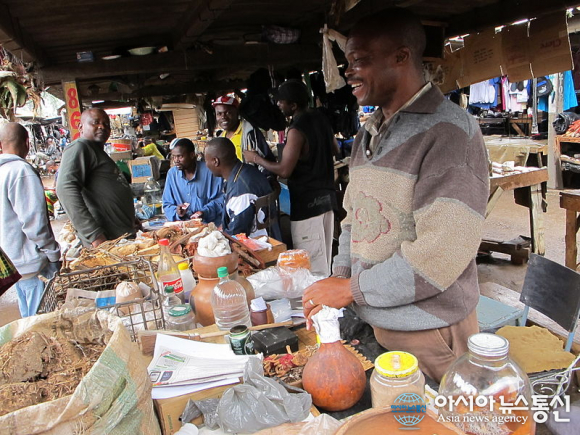 |
| Photo by: Shack Dwellers International via Wikimedia Commons |
Chinese foreign direct investments (FDI) contributed significantly to Zimbabwe’s recent economic boost.The Zimbabwe Investment Authority (ZIA) approved 929 million US dollars worth of FDI in 2015.More than half of the investments came from the Chinese government.
According to ZIA spokesperson Nixon Kanyemba, the Republic of Zimbabwe is looking forward to enticing more investments from China, particularly more on technology transfer as well as the sharing of knowledge and expertise with their local business people.
Among the largest foreign investors is Chinese tobacco company Tianze, which helped to revive Zimbabwe’s tobacco agriculture when the latter’s tobacco output declined to an all-time low of 48 million kilograms in 2008.Since then, Tianze has significantly contributed to the rehabilitation of Zimbabwe’s tobacco agricultural sector by injecting 40 million worth of US dollars annually in interest-free loans and subsidized inputs.Aside from financial provisions, the company likewise extended free technical support, training and other services to its farmers.
Through its support, Zimbabwe's tobacco output has increased to 217 million kilograms in 2014, which is just slightly short of its peak production of 231 million kilograms back in 2001.
"Chinese investment in the agricultural sector of Zimbabwe has, to a large extent, sustained its tobacco industry through the out-grower scheme operated by Chinese firms,” said Joseph Ngwawi, head of the Regional Economic Development Institute at the Southern Africa Research and Documentation Centre.
For Zimbabwe’s infrastructure sector, Chinese firms have forged multi-million-dollar deals for the establishment of the first batch of solar power plants in the country.
Back in 2015, Zimbabwe Power Company (ZPC) entered into an agreement with Intratrek Zimbabwe for the latter to collaborate with Chinese engineering firm CHINT Electric.The agreement was for the establishment of a power plant in Matabeleland South Province.Intratrek likewise forged deals with other Chinese companies for the establishment of two more solar power stations in Zimbabwe.
All these three projects will generate 100 megawatts each to feed 300 megawatts into the strained national grid, which currently struggles at less than 1,000 megawatts against peak demand of 2,200 megawatts.
Chinese companies also contributed largely to Zimbabwe’s commercial industry.In Harare, the most recognizable Chinese feature is the Long Cheng Plaza, where Zimbabweans get to shop, enjoy Chinese cuisine, and even celebrate parties and weddings.The mall was built by Chinese Anhui Foreign Economic Construction Corporation (AFECC) at an estimated cost of 200 million US.Dollars.

